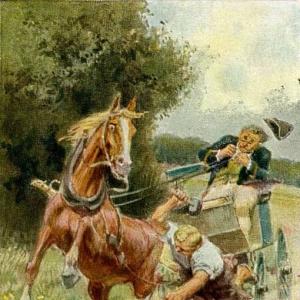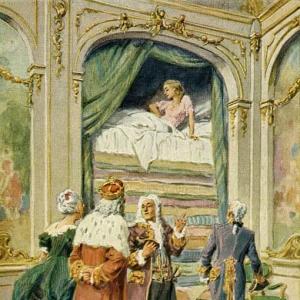Reading time: 21 min
There was once a fisherman and his wife who lived together in a hovel by the sea-shore, and the fisherman went out every day with his hook and line to catch fish, and he angled and angled. One day he was sitting with his rod and looking into the clear water, and he sat and sat. At last down went the line to the bottom of the water, and when he drew it up he found a great flounder on the hook.
And the flounder said to him, „Fisherman, listen to me. Let me go, I am not a real fish but an enchanted prince. What good shall I be to you if you land me? I shall not taste well. So put me back into the water again, and let me swim away.“ – „Well,“ said the fisherman, „no need of so many words about the matter, as you can speak I had much rather let you swim away.“
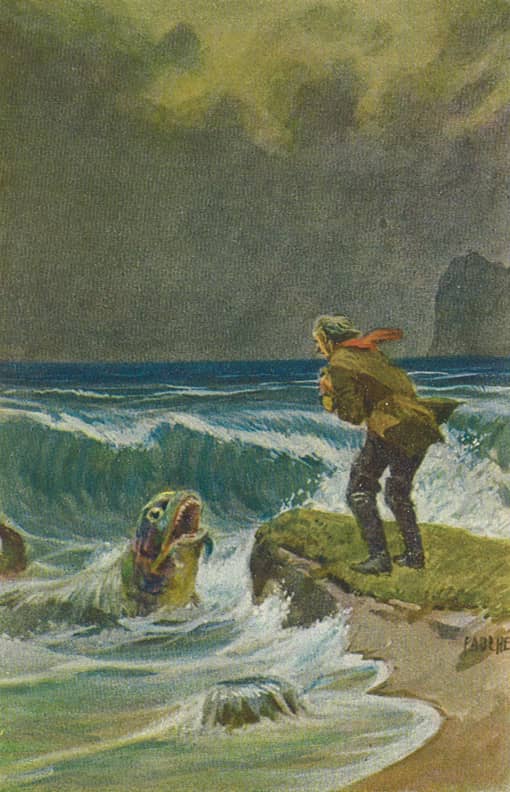 Image: Paul Hey (1867 – 1952)
Image: Paul Hey (1867 – 1952)Then he put him back into the clear water, and the flounder sank to the bottom, leaving a long streak of blood behind him. Then the fisherman got up and went home to his wife in their hovel. „Well, husband,“ said the wife, „have you caught nothing today?“ – „No,“ said the man „that is, I did catch a flounder, but as he said he was an enchanted prince, I let him go again.“ – „Then, did you wish for nothing?“ said the wife. „No,“ said the man. „What should I wish for?“
„Oh dear!“ said the wife. „And it is so dreadful always to live in this evil-smelling hovel j you might as well have wished for a little cottage. Go again and call him. Tell him we want a little cottage, I daresay he will give it us. Go, and be quick.“ And when he went back, the sea was green and yellow, and not nearly so clear. So he stood and said, „O man, O man! If man you be, Or flounder, flounder, in the sea. Such a tiresome wife I’ve got, For she wants what I do not.“ Then the flounder came swimming up, and said, „Now then, what does she want?“
„Oh,“ said the man, „you know when I caught you my wife says I ought to have wished for something. She does not want to live any longer in the hovel, and would rather have a cottage. „Go home with you,“ said the flounder, „she has it already.“ So the man went home, and found, instead of the hovel, a little cottage, and his wife was sitting on a bench before the door. And she took him by the hand, and said to him, „Come in and see if this is not a great improvement.“
So they went in, and there was a little house-place and a beautiful little bedroom, a kitchen and larder, with all sorts of furniture, and iron and brass ware of the very best. And at the back was a little yard with fowls and ducks, and a little garden full of green vegetables and fruit. „Look,“ said the wife, „is not that nice?“ – „Yes,“ said the man, „if this can only last we shall be very well contented.“ – „We will see about that,“ said the wife. And after a meal they went to bed. So all went well for a week or fortnight, when the wife said,
„Look here, husband, the cottage is really too confined, and the yard and garden are so small. I think the flounder had better get us a larger house. I should like very much to live in a large stone castle. So go to your fish and he will send us a castle.“ – „Oh my dear wife,“ said the man, „the cottage is good enough. What do we want a castle for?“ – „We want one,“ said the wife. „Go along with you. The flounder can give us one.“ – „Now, wife,“ said the man, „the flounder gave us the cottage. I do not like to go to him again, he may be angry.“ – „Go along,“ said the wife, „he might just as well give us it as not. Do as I say!“ The man felt very reluctant and unwilling; and he said to himself, „It is not the right thing to do“, nevertheless he went.
So when he came to the seaside, the water was purple and dark blue and grey and thick, and not green and yellow as before. And he stood and said, „O man, O man! If man you be, Or flounder, flounder, in the sea. Such a tiresome wife I’ve got, For she wants what I do not.“ – „Now then, what does she want?“, said the flounder. „Oh,“ said the man, half frightened, „she wants to live in a large stone castle.“ – „Go home with you, she is already standing before the door,“ said the flounder.
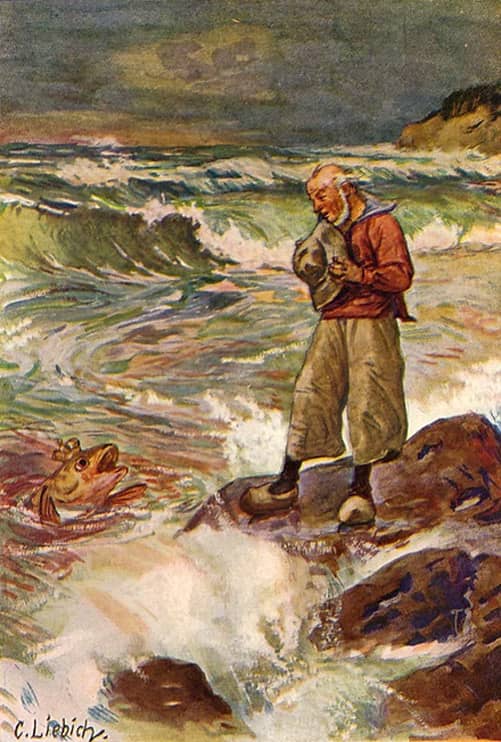
Then the man went home, as he supposed, but when he got there, there stood in the place of the cottage a great castle of stone, and his wife was standing on the steps, about to go in. So she took him by the hand, and said, „Let us enter.“ With that he went in with her, and in the castle was a great hall with a marble- pavement, and there were a great many servants, who led them through large doors, and the passages were decked with tapestry, and the rooms with golden chairs and tables, and crystal chandeliers hanging from the ceiling. And all the rooms had carpets.
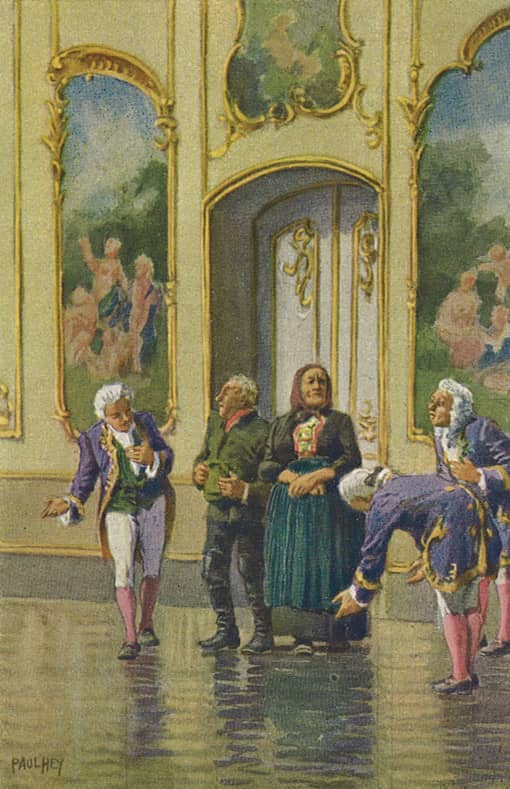 Image: Paul Hey (1867 – 1952)
Image: Paul Hey (1867 – 1952)And the tables were covered with eatables and the best wine for any one who wanted them. And at the back of the house was a great stable-yard for horses and cattle, and carriages of the finest. Besides, there was a splendid large garden, with the most beautiful flowers and fine fruit trees, and a pleasance full half a mile long, with deer and oxen and sheep, and everything that heart could wish for. „There! „said the wife, „is not this beautiful?“
„Oh yes,“ said the man, „if it will only last we can live in this fine castle and be very well contented.“ – „We will see about that,“ said the wife, „in the meanwhile we will sleep upon it.“ With that they went to bed. The next morning the wife was awake first, just at the break of day, and she looked out and saw from her bed the beautiful country lying all round. The man took no notice of it, so she poked him in the side with her elbow, and said, „Husband, get up and just look out of the window. Look, just think if we could be king over all this country. Just go to your fish and tell him we should like to be king.“
„Now, wife,“ said the man, „what should we be kings for? I don’t want to be king.“ – „Well,“ said the wife, „if you don’t want to be king, I will be king.“ – „Now, wife,“ said the man, „what do you want to be king for? I could not ask him such a thing.“ – „Why not?“ said the wife, „you must go directly all the same. I must be king.“ So the man went, very much put out that his wife should want to be king. „It is not the right thing to do-not at all the right thing,“ thought the man. He did not at all want to go, and yet he went all the same. And when he came to the sea the water was quite dark grey, and rushed far inland, and had an ill smell. And he stood and said,
“ O man, O man! If man you be, Or flounder, flounder, in the sea. Such a tiresome wife I’ve got, For she wants what I do not.“ – „Now then, what does she want?“, said the fish. „Oh dear!“ said the man, „she wants to be king.“ – „Go home with you, she is so already,“ said the fish. So the man went back, and as he came to the palace he saw it was very much larger, and had great towers and splendid gateways. The herald stood before the door, and a number of soldiers with kettle-drums and trumpets.
And when he came inside everything was of marble and gold, and there were many curtains with great golden tassels. Then he went through the doors of the saloon to where the great throne-room was, and there was his wife sitting upon a throne of gold and diamonds, and she had a great golden crown on, and the sceptre in her hand was of pure gold and jewels, and on each side stood six pages in a row, each one a head shorter than the other. So the man went up to her and said, „Well, wife, so now you are king!“
„Yes,“ said the wife, „now I am king.“ So then he stood and looked at her, and when he had gazed at her for some time he said, „Well, wife, this is fine for you to be king! now there is nothing more to wish for.“ – „O husband!“ said the wife, seeming quite restless, „I am tired of this already. Go to your fish and tell him that now I am king I must be emperor.“ – „Now, wife,“ said the man, „what do you want to be emperor for?“ – „Husband“, said she, „go and tell the fish I want to be emperor!“ – „Oh dear!“ said the man, „he could not do it-I cannot ask him such a thing. There is but one emperor at a time. The fish can’t possibly make any one emperor-indeed he can’t.“
„Now, look here,“ said the wife, „I am king, and you are only my husband, so will you go at once? Go along! for if he was able to make me king he is able to make me emperor. And I will and must be emperor, so go along!“ So he was obliged to go. And as he went he felt very uncomfortable about it, and he thought to himself, „It is not at all the right thing to do; to want to be emperor is really going too far. The flounder will soon be beginning to get tired of this.“ With that he came to the sea, and the water was quite black and thick, and the foam flew, and the wind blew, and the man was terrified.
But he stood and said, „O man, O man! If man you be, Or flounder, flounder, in the sea. Such a tiresome wife I’ve got, For she wants what I do not.“ – „What is it now?“, said the fish. „Oh dear! „said the man, „my wife wants to be emperor.“ – „Go home with you,“ said the fish, „she is emperor already.“ So the man went home, and found the castle adorned with polished marble and alabaster figures, and golden gates. The troops were being marshalled before the door, and they were blowing trumpets and beating drums and cymbals. And when he entered he saw barons and earls and dukes waiting about like servants.
And the doors were of bright gold. And he saw his wife sitting upon a throne made of one entire piece of gold, and it was about two miles high. And she had a great golden crown on, which was about three yards high, set with brilliants and carbuncles. And in one hand she held the sceptre, and in the other the globe. And on both sides of her stood pages in two rows, all arranged according to their size, from the most enormous giant of two miles high to the tiniest dwarf of the size of my little finger.
And before her stood earls and dukes in crowds. So the man went up to her and said, „Well, wife, so now you are emperor.“ – „Yes,“ said she, „now I am emperor.“ Then he went and sat down and had a good look at her, and then he said, „Well now, wife, there is nothing left to be, now you are emperor.“ – „What are you talking about, husband?“ said she. „I am emperor, and next I will be pope! so go and tell the fish so.“ – „Oh dear!“ said the man, „what is it that you don’t want? You can never become pope. There is but one pope in Christendom, and the fish can’t possibly do it.“
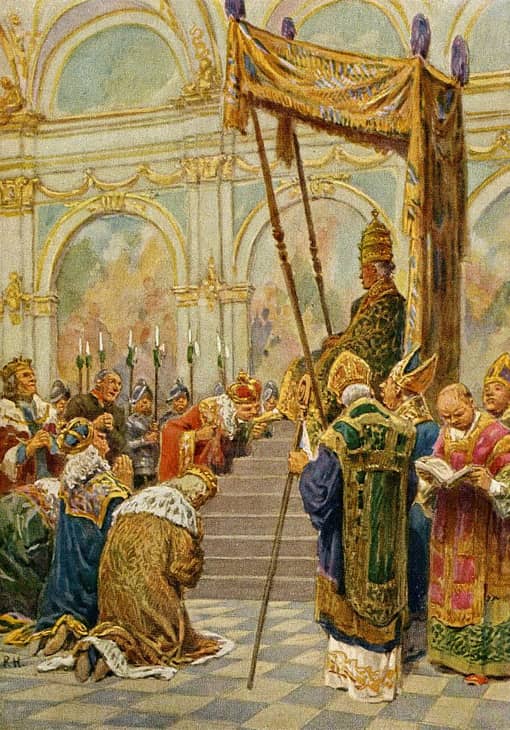 Image: Paul Hey (1867 – 1952)
Image: Paul Hey (1867 – 1952)„Husband,“ said she, „no more words about it. I must and will be pope. So go along to the fish.“ – „Now, wife,“ said the man, „how can I ask him such a thing? it is too bad-it is asking a little too much. And, besides, he could not do it.“ – „What rubbish!“ said the wife. “If he could make me emperor he can make me pope. Go along and ask him. I am emperor, and you are only my husband, so go you must.“ So he went, feeling very frightened, and he shivered and shook, and his knees trembled.
And there arose a great wind, and the clouds flew by, and it grew very dark, and the sea rose mountains high, and the ships were tossed about, and the sky was partly blue in the middle, but at the sides very dark and red, as in a great tempest. And he felt very desponding, and stood trembling and said, „O man, O man! If man you be, Or flounder, flounder, in the sea. Such a tiresome wife I’ve got, For she wants what I do not.“ „Well, what now?“, said the fish. „Oh dear!“ said the man, „she wants to be pope.“ – „Go home with you, she is pope already,“ said the fish. So he went home, and he found himself before a great church, with palaces all round.
He had to make his way through a crowd of people. And when he got inside he found the place lighted up with thousands and thousands of lights. And his wife was clothed in a golden garment, and sat upon a very high throne, and had three golden crowns on, all in the greatest priestly pomp. And on both sides of her there stood two rows of lights of all sizes-from the size of the longest tower to the smallest rushlight, and all the emperors and kings were kneeling before her and kissing her foot.
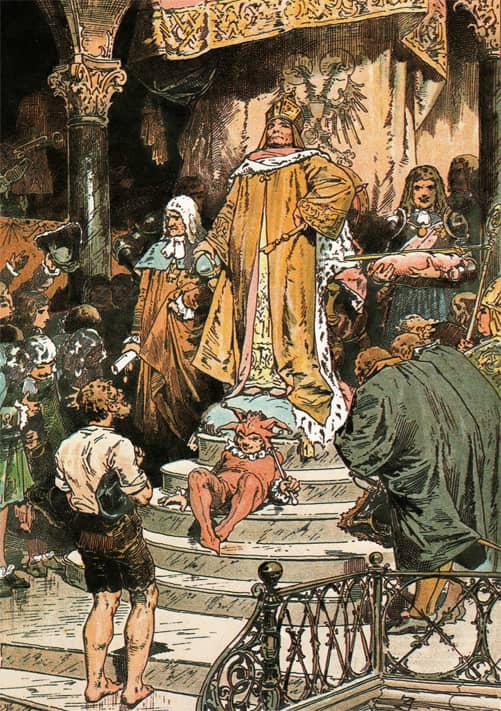
„Well, wife,“ said the man, and sat and stared at her, „so you are pope.“ – „Yes,“ said she, „now I am pope!“ And he went on gazing at her till he felt dazzled, as if he were sitting in the sun. And after a little time he said, „Well, now, wife, what is there left to be, now you are pope?“ And she sat up very stiff and straight, and said nothing. And he said again, „Well, wife, I hope you are contented at last with being pope. You can be nothing more.“ – „We will see about that,“ said the wife. With that they both went to bed. But she was as far as ever from being contented, and she could not get to sleep for thinking of what she should like to be next.
The husband, however, slept as fast as a top after his busy day. But the wife tossed and turned from side to side the whole night through, thinking all the while what she could be next, but nothing would occur to her. And when she saw the red dawn she slipped off the bed, and sat before the window to see the sun rise, and as it came up she said, „Ah, I have it! what if I should make the sun and moon to rise-husband!“, she cried, and stuck her elbow in his ribs, „wake up, and go to your fish, and tell him T want power over the sun and moon.“
The man was so fast asleep that when he started up he fell out of bed. Then he shook himself together, and opened his eyes and said, „Oh, wife, what did you say?“ – „Husband,“ said she, „if I cannot get the power of making the sun and moon rise when I want them, I shall never have another quiet hour. Go to the fish and tell him so.“ – „O wife!“ said the man, and fell on his knees to her, „the fish can really not do that for you. I grant you he could make you emperor and pope. Do be contented with that, I beg of you.“
And she became wild with impatience, and screamed out, „I can wait no longer, go at once!“ And so off he went as well as he could for fright. And a dreadful storm arose, so that he could hardly keep his feet. And the houses and trees were blown down, and the mountains trembled, and rocks fell in the sea. The sky was quite black, and it thundered and lightened. And the waves, crowned with foam, ran mountains high. So he cried out, without being able to hear his own words, „O man, O man! If man you be, Or flounder, flounder, in the sea- Such a tiresome wife I’ve got, For she wants what I do not.“
„Well, what now?“, said the flounder. „Oh dear!“ said the man, „she wants to order about the sun and moon.“ – „Go home with you!“ said the flounder, „you will find her in the old hovel.“ And there they are sitting to this very day.
 Learn languages. Double-tap on a word.Learn languages in context with Childstories.org and Deepl.com.
Learn languages. Double-tap on a word.Learn languages in context with Childstories.org and Deepl.com.Backgrounds
Interpretations
Adaptions
Summary
Abstract
Linguistics
„The Fisherman and His Wife“ is a German fairy tale collected and published by the Brothers Grimm in the early 19th century as part of their famous collection „Grimm’s Fairy Tales.“ The story shares similarities with other folktales and has a rich background rooted in various elements:
Oral tradition: Like many other stories in the Grimm’s collection, „The Fisherman and His Wife“ has its roots in the oral tradition of storytelling. The tale was passed down through generations via word of mouth before being documented and published by the Brothers Grimm.
European folklore: The story shares themes and motifs with other European folktales, such as magical beings granting wishes and the consequences of greed. These themes can be traced back to ancient myths, legends, and folktales from various cultures.
Social commentary: The tale can be seen as a social commentary on greed and the dangers of excessive ambition. The fisherman’s wife continually asks for more power and wealth, never being satisfied with what she has. This ultimately leads to their downfall, as the magical fish revokes all the wishes, teaching a moral lesson about the importance of being content with one’s lot in life.
The Brothers Grimm: Jacob and Wilhelm Grimm, the collectors and publishers of the tale, were German academics who aimed to preserve the cultural heritage of their country. They collected folktales from various sources, often from the oral tradition, and edited them for publication. Their work was part of the larger Romantic movement, which sought to reclaim and elevate traditional folk culture. The Brothers Grimm were German scholars and linguists who collected and published traditional folktales from various regions of Germany and Europe. Their work aimed to preserve the oral traditions and cultural heritage of the time. The tales they gathered often contained moral lessons, fantastical elements, and cautionary themes.
Influence of other tales: „The Fisherman and His Wife“ shares similarities with other folktales, such as „The Three Wishes“ and „The Stonecutter.“ These stories also feature protagonists who are granted wishes by magical beings, often learning valuable lessons about the consequences of greed and ambition. The exchange of stories between different cultures and regions likely influenced the development and evolution of these tales.
Story: The story of „The Fisherman and His Wife“ revolves around a poor fisherman who catches a magical talking flounder. The flounder claims to be an enchanted prince and begs the fisherman to release him. In return for sparing his life, the flounder grants the fisherman’s wife a series of wishes, which escalate in extravagance and ambition. The fisherman’s wife becomes increasingly dissatisfied and greedy, ultimately leading to their downfall when the flounder, fed up with her demands, returns them to their original state of poverty.
The tale is a cautionary story that warns against the dangers of greed, the importance of contentment, and the consequences of one’s actions. It also explores themes such as the responsible use of power, the dynamics of marital relationships, and the significance of moral choices. In summary, „The Fisherman and His Wife“ is a product of centuries of storytelling and cultural exchange, reflecting themes and values that were important to the people who passed the tale down through generations. The Brothers Grimm’s efforts to collect and preserve these stories have ensured their continued popularity and relevance in modern times.
„The Fisherman and His Wife“ has been subject to various interpretations over time, as readers and scholars alike have sought to extract meaning from the tale. Some of the key interpretations include.
Greed and discontentment: The primary interpretation of this tale revolves around the dangers of greed and the dissatisfaction that comes with it. The fisherman’s wife is never content with what she has and continually desires more. This insatiable hunger for power and wealth ultimately leads to their downfall when the magical flounder returns them to their original state. One of the most prevalent themes in the story is the danger of unchecked greed and ambition. The fisherman’s wife continually asks for more, never being content with what she has. This ultimately leads to their downfall, as the magical fish revokes all their wishes. The story serves as a cautionary tale against excessive greed and the importance of being satisfied with one’s circumstances.
Gratitude and simplicity: The fisherman, in contrast to his wife, is content with the simple life they lead and expresses gratitude for what they have. The tale teaches the importance of appreciating and valuing the things we already have instead of always striving for more.
The consequences of abusing power: The fisherman’s wife demonstrates the potential negative effects of wielding power irresponsibly. As she gains more authority, she becomes more demanding and unreasonable, which ultimately results in her losing everything. The tale can also be interpreted as a commentary on the corrupting nature of power. As the fisherman’s wife gains more power through her wishes, she becomes increasingly detached from her humble origins and loses sight of what is truly important. This showcases the potential pitfalls of seeking power for its own sake.
The impact of moral choices: The fisherman is faced with several moral choices throughout the story, such as whether to release the enchanted flounder or grant his wife’s increasingly outlandish wishes. The tale illustrates the potential consequences of making morally questionable decisions, as well as the importance of standing up for one’s beliefs.
The relationship between husband and wife: The story also delves into the dynamics of the fisherman and his wife’s relationship, showcasing the potential harm that can come from an imbalance of power and a lack of mutual respect and understanding.
Balance and moderation: Another interpretation of the story focuses on the importance of balance and moderation in life. The fisherman’s wife’s inability to appreciate her good fortune and her constant desire for more eventually causes their undoing. The tale emphasizes the need for finding balance between ambition and contentment in order to achieve a fulfilling life.
The role of women: The story also touches upon the role of women in society, especially during the time it was written. The fisherman’s wife is portrayed as the driving force behind their growing ambition, while the fisherman himself is more passive and hesitant. This could be interpreted as a critique of traditional gender roles, or as a reflection of societal attitudes toward women’s desires and ambitions.
Environmental stewardship: Some interpretations of the tale highlight the relationship between humans and nature. The magical fish, who grants the couple’s wishes, can be seen as a representation of the natural world and its resources. The fisherman’s wife’s insatiable desires can be viewed as a metaphor for humanity’s exploitation of nature, with the eventual loss of their wishes serving as a warning against overconsumption and environmental degradation.
In conclusion, „The Fisherman and His Wife“ has been interpreted in various ways over the years, reflecting different values and themes such as greed, power, balance, gender roles, and environmental stewardship. These interpretations contribute to the story’s enduring appeal and cultural significance. Overall, „The Fisherman and His Wife“ offers valuable lessons on the importance of gratitude, the dangers of greed, the responsible use of power, and the consequences of our moral choices.
„The Fisherman and His Wife“ is a German fairy tale collected by the Brothers Grimm, Jacob and Wilhelm, in the early 19th century. It is also known as „Von dem Fischer un syner Fru“ in Low German. The story was included in their famous anthology „Kinder- und Hausmärchen“ (Children’s and Household Tales), first published in 1812. „The Fisherman and His Wife“ has inspired numerous adaptations across different media. Some specific examples include.
Films: In 2005, a German film adaptation of the fairy tale was produced, titled „Der Fischer und seine Frau“ (The Fisherman and His Wife). Directed by Doris Dörrie, this modern take on the story focuses on a couple’s materialistic pursuits and the consequences of their uncontrolled desires. The story has been adapted into several films and TV shows.
Television: The story has been adapted for television in various forms, such as animated series episodes and live-action adaptations. For example, an episode of the animated series „Simsala Grimm“ (1999-2010) features the tale. Additionally, the fairy tale was also adapted in the live-action series „Grimm’s Fairy Tales for Adults“ (1969-1970) as an episode called „The Fisherman and His Wife.“
Theater: The story has been adapted for stage performances, such as plays and musicals. In 2013, the Children’s Theater Company in Minneapolis staged a theatrical adaptation of the fairy tale, which combined elements of puppetry, live music, and storytelling. The story has been adapted into a musical theatre production called „The Fisherman and His Wife: The Musical,“ with music by Neil Bartram and lyrics by Brian Hill.
Books: The story has been retold and adapted in various forms in children’s books, illustrated editions, and anthologies. One example is the picture book „The Fisherman and His Wife“ by Rachel Isadora, which retells the tale with vibrant illustrations. The story has been adapted into numerous children’s books, including versions by renowned illustrators such as Bernadette Watts, Rachel Isadora, and Marcia Brown.
Operas and ballets: The story has been adapted into several operas and ballets, such as John Adams‘ opera „A Flowering Tree“ and Alexei Ratmansky’s ballet „The Bright Stream.“
Radio: Radio adaptations of the story have been produced as well. For instance, in 2012, BBC Radio 4 aired a modern adaptation of the tale as part of the „Grimm Thoughts“ series, which reimagined the stories for contemporary audiences.
Art: The story has inspired visual artists to create illustrations and artwork based on the tale. For example, renowned fairy tale illustrator Arthur Rackham created a series of illustrations for „The Fisherman and His Wife“ as part of his work on the Grimm’s Fairy Tales collection.
„The Fisherman and His Wife“ is a popular fairy tale that has been adapted in various forms across different media. These adaptations showcase the versatility and enduring appeal of „The Fisherman and His Wife.“ The story continues to resonate with audiences in various forms, demonstrating the timeless nature of its themes and narrative.
„The Fisherman and His Wife“ is a fairy tale by the Brothers Grimm that tells the story of a poor fisherman, his wife, and their encounters with a magical fish who grants their wishes. The story begins with the fisherman catching a beautiful, talking fish that claims to be an enchanted prince. The fish begs the fisherman to release him, and in return, promises to grant him a wish.
The fisherman, being a kind-hearted man, sets the fish free without asking for anything. When the fisherman returns home and tells his wife about the magical fish, she insists that he should have asked for a wish. She urges him to go back and ask the fish for a modest house to replace their rundown shack. The fisherman hesitates but eventually gives in to his wife’s wishes. The fish, surprisingly, grants their wish, and they find themselves living in a cozy house.
However, the wife’s desires grow, and she sends her husband back to the fish several times, asking for increasingly grand wishes. Each time, the fish fulfills their wishes, but the wife remains unsatisfied. They go from living in a beautiful mansion to owning a castle, and eventually, she demands to be made the ruler of the sun and the moon.
The fisherman, weary and disillusioned, asks the fish for his wife’s final wish. However, this time, the magical fish, tired of the wife’s insatiable greed, decides to teach them a lesson. Instead of granting her wish to rule over the sun and the moon, the fish takes away everything they have gained, leaving them back in their original, humble shack. The story concludes with the fisherman and his wife returning to their simple life, having learned the consequences of unchecked greed and ambition. The tale serves as a cautionary lesson about the importance of being content with what one has and the dangers of always wanting more.
„The Fisherman and His Wife“ is a fairy tale by the Brothers Grimm about a fisherman and his wife who live in a small hovel by the sea. One day, the fisherman catches a talking flounder who claims to be an enchanted prince. The fisherman releases the flounder, who grants the couple’s wishes in exchange for his freedom.
At first, the wife wishes for a little cottage, which the flounder provides. Unsatisfied, she asks for a larger house, and the fish obliges. Her desires escalate, and she demands a castle, then to become a king, an emperor, and finally, the Pope. Each time, the fisherman reluctantly asks the flounder to grant her wishes, and each time the flounder complies.
As the wife’s power grows, so do the fisherman’s doubts and the sea’s turbulence. When she wishes to become Pope, the fisherman’s fears intensify, and he pleads with his wife to be content with what they have. But she insists, and the fisherman makes his final request to the flounder. The fish grants the wife’s wish to be Pope, but as the fisherman returns home, he finds that everything has been taken away, and they are back in their original hovel. The fisherman and his wife learn that their greed and ambition have left them with nothing, and they must start over with the simple life they once knew.
The fairy tale „The Fisherman and His Wife“ by the Brothers Grimm is a rich source for linguistic and thematic analysis.
Here are some key aspects to consider
Dialogue and Repetition: The story heavily relies on dialogue between characters, particularly between the fisherman and his wife. The use of repetition in dialogue, such as the wife’s repeated demands and the fisherman’s repetitive plea to the flounder, plays a significant role in building the narrative’s rhythm and tension. The repetitive incantation, „O man, O man! If man you be, Or flounder, flounder, in the sea,“ enhances the fairy-tale quality and serves as a ritualistic call to the flounder.
Syntax and Structure: The story employs simple sentence structures typical of oral storytelling, making it accessible to a wide audience, including children. The use of coordinating conjunctions like „and“ contributes to a continuous, unfolding narrative flow, reminiscent of traditional storytelling.
Lexical Choices: The language is straightforward, using vocabulary that is easy to understand yet vivid in its descriptions (e. g. , „great hall,“ „marble-pavement,“ „splendid large garden“). The adjectives often convey the escalating grandeur of the wife’s wishes, creating a sense of excess and folly.
Tone and Style: The tone is pastoral and moralistic, with a touch of irony, especially in the fisherman’s resigned and increasingly distressed responses. The contrast in tone between the wife’s command and the fisherman’s reluctance adds to the dynamic tension and moral underpinning of the story.
Thematic Analysis
Desire and Contentment: The central theme is the destructive nature of greed and the lack of contentment. The wife’s insatiable desire for more power and luxuries reflects human folly and the moral consequences of overreaching ambition. The progression of her wishes from a cottage to controlling celestial bodies highlights the absurdity and futility of unchecked desire.
Power Dynamics: The story explores power dynamics within marriage and society. The wife’s dominance in the relationship, insisting on her wishes against her husband’s warnings, mirrors themes of authority and submission. The flounder, though powerful enough to grant wishes, is limited by the moral lessons it imparts, ultimately restoring balance by returning the couple to their original state.
Nature and the Supernatural: The sea serves as a symbol of the supernatural and the natural world’s boundaries that the wife’s wishes continually push against. Changes in the sea’s color and temperament parallel the storyline’s escalating tension and moral imbalance.
Folkloric and Moral Elements: The tale is rich in traditional folkloric elements, such as magical creatures (the enchanted flounder), and follows a moralistic framework typical of fairy tales where excessive greed leads to downfall. The resolution, which sees the couple return to their humble beginnings, emphasizes a return to the natural order and the importance of humility and gratitude.
In summary, „The Fisherman and His Wife“ is a compelling narrative that uses simple yet effective linguistic features to convey deep moral lessons about contentment and the perils of greed. Through its language, structure, and thematic content, the story remains a powerful vehicle for imparting traditional values and cautionary wisdom.
Information for scientific analysis
Fairy tale statistics | Value |
|---|---|
| Number | KHM 19 |
| Aarne-Thompson-Uther-Index | ATU Typ 555 |
| Translations | DE, EN, DA, ES, FR, PT, FI, HU, IT, JA, NL, PL, RO, RU, TR, VI, ZH |
| Readability Index by Björnsson | 21.8 |
| Flesch-Reading-Ease Index | 92.7 |
| Flesch–Kincaid Grade-Level | 3.7 |
| Gunning Fog Index | 6.6 |
| Coleman–Liau Index | 6 |
| SMOG Index | 6.8 |
| Automated Readability Index | 2.8 |
| Character Count | 14.708 |
| Letter Count | 10.818 |
| Sentence Count | 216 |
| Word Count | 2.926 |
| Average Words per Sentence | 13,55 |
| Words with more than 6 letters | 242 |
| Percentage of long words | 8.3% |
| Number of Syllables | 3.471 |
| Average Syllables per Word | 1,19 |
| Words with three Syllables | 85 |
| Percentage Words with three Syllables | 2.9% |
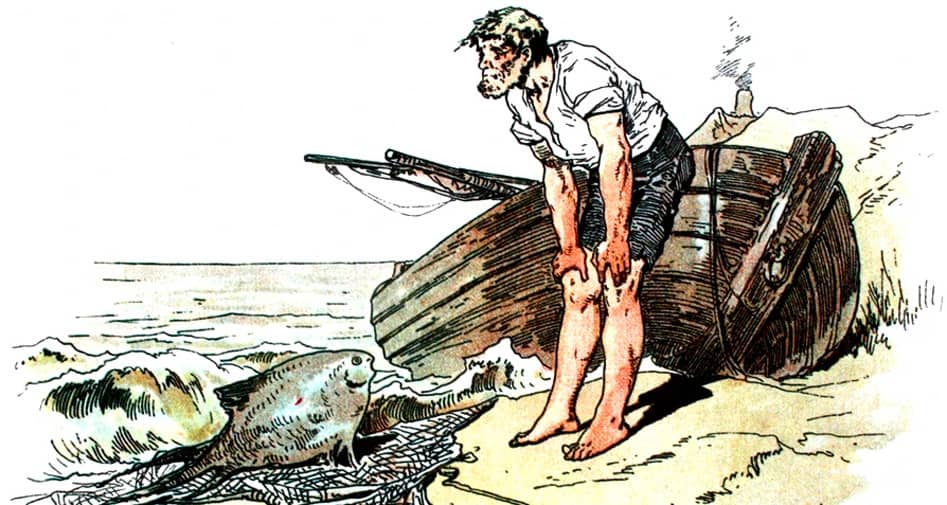
 Facebook
Facebook  Whatsapp
Whatsapp  Messenger
Messenger  Telegram
Telegram Reddit
Reddit